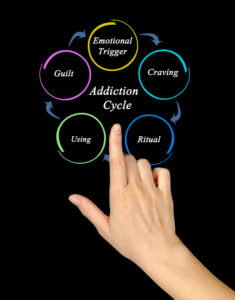In the United States, we tend to think of our children’s 18th birthday as the day they finally leave the family nest and become independent adults. In other words, when they turn 18, our job is over and we can relax… right?
Sometimes, things might work out that way, but for the most part, parenting is actually a lifelong career. Our kids will always need us, and one day we will need them too. The thing is, the older our kids get, the harder it is to make a difference in their lives. As children, bad behavior could usually be managed with some simple rules and consequences. However, when our kids, are actually full-grown adults, it’s not clear what our role as parents should look like. When we see them behaving in harmful ways, perhaps using drugs or blowing money away, what do we do?
Do we punish?
Bear the burden of their consequences?
Turn our backs?
No, no, and definitely no. These responses can damage your relationship, encourage the dangerous behavior, and leave everyone feeling more alone and disappointed.
Let’s talk about some steps you can take to form real positive change. Forget the arguments, yelling, and babying; it’s time to do something different. Here are our 3 tips for parents coping with their child’s destructive behavior:
1. Study up
First and foremost, the most important thing you can do right now is to learn more about addiction. Although your child’s actions might seem willful and malicious, it’s important to realize that drug-use (or alcohol use, self-harm, etc.) stopped being a conscious choice a long time ago. Addiction and related disorders are chronic, life-threatening, neurological diseases with plenty of research and physical evidence to prove it.
Knowledge is power! When families have a thorough understanding of addiction, things tend to work out better for everyone:
- There will be less tension since you, the parents will be more aware of the things happening to your child and how he or she really feels.
- You will be able to react quickly to your child’s needs, and more skillfully navigate the options available for rehabilitation, and other addiction treatment services.
- Knowing more about treatment strategies means you can forget about fear and blame, and just focus on moving forward.
Do your research! Hit the library, go on a Google binge, talk with experts or peers who have experienced the same thing.
2. Evaluate Boundaries
How much support is too much? Are we smothering our kids or are we not helping them enough?  Should we be providing financial support? At what point do we ask them to leave the family home?
Should we be providing financial support? At what point do we ask them to leave the family home?
These are very important, and common questions that all tie back to the topic of boundaries.
The term boundaries refers to the imaginary lines we set within our relationships to make sure that no one feels violated or ignored. Crossing boundaries can make our adult children feel, well, like children and lead to dependent, incapable, and immature self-image. Additionally, when our kids act out in a way that crosses our boundaries, we’re likely to feel used, manipulated, hurt, and humiliated.
If we don’t recognize unhealthy boundaries, we can either unwillingly support the addiction (or other problematic behavior) by being ‘too accepting’ or fuel our child’s addiction by stressing them with punishments and denying our parental support.
When evaluating boundaries within the family unit look for signs of:
Codependency:
This happens when two people grow to depend on each other far too much. People become codependent to gain an emotional sense of acceptance as well as to meet creature needs, like housing, food, and spending money. The problem with codependency is that other relationships wither, and ‘spoiling’ our children in this way can encourage them to continue their behavior. A codependent relationship usually is one-directional, where one person soaks up all of the resources and energy of the other, who gains a feeling of worth from the ‘protector’ role.
Violations:
At some point or another, we will all feel a sense of violation when someone disrespects our privacy, dignity, or personal space. As parents, we may feel the urge to search through our children’s things or bust into a room when we’re not invited if we sense. Be careful with such actions, because they will make your adult child feel like an untrustworthy teenager again, further damaging their self-esteem, which is a vital component to recovery.
Impossible demands:
Get a job! Get clean! Contribute to the household! Move out already!
Sound familiar?
I get it, you want your kid to get their act together, and to have it done yesterday if possible. Pressure, anger, threats, ‘cold-shoulder’ tactics, bargaining, and whatever other aggressions going on in the household could be making the situation worse. The thing is, however much you want these things to happen, your current tactics might not be the best way to ensure they will. If demands aren’t working, and your kid seems more and more upset and less and less motivated, it might be time to try some softness. Offer a helping hand by inviting them to treatment.
3. Take Care of Yourself
How are you holding up? This can be a frustrating time, and frankly, a lot of difficult emotions are going to come up on the road forward.
Many parents talk about feeling like their child’s addiction is their fault and thus get lost in a cycle of doubt and self-criticism. Remember: No one is a perfect parent, but we all try our best, and your child is now a responsible adult with the power to make their own decisions. Recognize that at this point, you cannot control your child like when they were actually children, and trying to do so will just be frustrating. All we can do now as parents are love, guide, and support them through their own personal transition. We cannot do it for them, nor can we ‘save’ a person, we can only help as best we can. Recognize your limits, but don’t blame yourself for them.
Here are some self-care tips that might help you as you help your kid
Be with people:
Don’t isolate yourself, especially because of feelings like guilt or shame. You should talk about what you’re feeling, it’ll surprise you how many other people will be able to relate, and offer assistance. Sometimes a friend is what you need, but a support group for other parents like you could actually be more helpful in some cases.
Mind your spending:
How much, and how often do you give your child money to pay for legal problems, food, gas, rent, or even (unknowingly) drugs and alcohol? Be careful with your resources, and only support your child as much as you can reasonably spend without going broke yourself. Set limits and try supporting your child in other ways: offer a plate of food, or a ride to where they need to go instead of a wad of cash. Sometimes, the right thing to do when your child asks too much is to just say no.
Let go, and Love:
Okay, sounds corny, but it’s really important.
You love your child right? Although you might be feeling terribly angry, disappointed, betrayed or upset right now, underneath it all you love your child so much that you’ve ended up here reading this article because you want to help them. Tap into that love, and let it guide you, try your best to let the anger go. It just complicates things and may prevent you and your child from taking action.
HELP YOUR ADDICTED CHILD AT OUR DRUG TREATMENT CENTER
If you or your loved one are ready to stop using drugs, reach out to our Los Angeles drug treatment center. Getting started on the road to recovery can be hard, however, once you make the call, the hardest part is over.
Do not let another second go by. Reach out for help right now.













